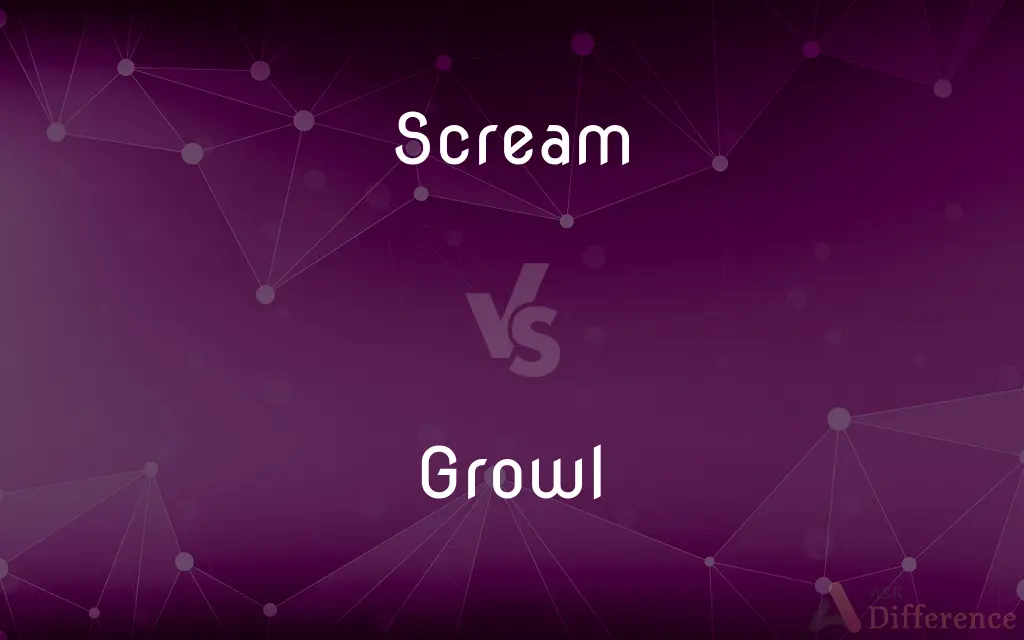Scream vs. Growl — What's the Difference?
By Tayyaba Rehman & Maham Liaqat — Updated on April 5, 2024
A scream is a loud, high-pitched vocalization, often indicating fear or excitement, while a growl is a low, guttural sound, signaling aggression or discontent.

Difference Between Scream and Growl
Table of Contents
ADVERTISEMENT
Key Differences
Screams are typically associated with intense emotions such as fear, excitement, or pain, conveying a sense of urgency or alarm. They can be involuntary reactions to sudden surprises or deliberate calls for attention. Whereas growls are often associated with animals, especially predators, and are used to convey aggression, warning, or territoriality, humans also growl to express frustration or anger, though less frequently.
While screaming is a vocalization that varies significantly in pitch, often reaching the highest registers of the human voice, it serves as a powerful means of communication across various species, signaling distress or calling for help. On the other hand, growling is characterized by its low pitch and rumbling quality, emanating from deep within the throat, primarily used as a threat or a sign of displeasure.
Screaming can be found across a wide range of situations, from joy at a celebration to terror in dangerous circumstances, illustrating its versatility as a form of emotional expression. Growls, however, are more narrowly used, typically in contexts of confrontation or defense, highlighting their role in establishing dominance or expressing discontent.
In human communication, screams can signify extreme emotions and are often uncontrollable, reflecting a primal response to overwhelming situations. Whereas growls, though less common in everyday interactions, can indicate deep-seated frustration or anger, often serving as a prelude to verbal or physical confrontation.
The physical mechanism of screaming involves the rapid expulsion of air from the lungs, causing the vocal cords to vibrate at high frequencies. This contrasts with growling, where the sound originates from the back of the throat, with the vocal cords producing a lower frequency vibration, resulting in a menacing tone.
ADVERTISEMENT
Comparison Chart
Emotional State
Fear, excitement, pain
Aggression, frustration, warning
Pitch
High, varying
Low, rumbling
Usage Context
Broad (joy, terror, surprise)
Narrow (threat, displeasure)
Communication
Emotional expression, call for help
Threat, dominance, displeasure
Physical Origin
Rapid air expulsion, high-frequency vocal cord vibration
Back of the throat, low-frequency vocal cord vibration
Compare with Definitions
Scream
Expression of Fear.
His scream in the dark alley echoed the panic he felt.
Growl
Low Pitched Sound.
The bear's growl in the forest was deep and menacing.
Scream
Loud Vocalization.
The child's scream during the movie indicated her fright.
Growl
Sign of Displeasure.
The cat's growl at the new pet signaled its unhappiness.
Scream
Show of Excitement.
Their screams at the concert were signs of their overwhelming joy.
Growl
Warning Sound.
The dog's growl warned strangers not to come closer.
Scream
Signal for Help.
She let out a piercing scream for help when she saw the rising waters.
Growl
Expression of Anger.
His growl during the argument showed his frustration.
Scream
Indication of Pain.
The patient's scream made it clear how much pain he was in.
Growl
Indication of Hunger or Threat.
Her stomach let out a growl, reminding her it was lunchtime.
Scream
To utter a long loud piercing cry, as from pain or fear.
Growl
The low, guttural, menacing sound made by an animal
The growl of a dog.
Scream
To make a loud piercing sound
Jet planes screamed through the air.
Growl
A gruff surly utterance
The desk officer answered my greeting with a growl.
Scream
To speak or write in an excited or fearful manner.
Growl
To emit a low guttural sound or utterance.
Scream
To have or produce a startling effect
The outlandish costume screamed with clashing colors.
Growl
To speak in an angry or surly manner.
Scream
To utter or say in a screaming voice or in an excited or fearful manner
The fans screamed their displeasure.
Growl
To utter by growling
Growled the orders.
Scream
A long, loud, piercing cry or sound.
Growl
A deep, rumbling, threatening sound made in the throat by an animal.
Scream
(Informal) One that is hilariously or ridiculously funny
The new play was a scream.
Growl
(by extension) A similar sound made by a human.
Scream
A loud, emphatic, exclamation of extreme emotion, especially horror, fear, excitement, or anger; it may comprise a word or a sustained, high-pitched vowel sound.
Growl
(by extension) The rumbling sound made by a human's hungry stomach.
Scream
A loud vocalisation of many animals, especially in response to pain or fear.
Growl
(by extension) An aggressive grumbling.
Scream
(music) A form of singing associated with the metal and screamo styles of music. It is a loud, rough, distorted version of the voice; rather than the normal voice of the singer.
Growl
A low-pitched rumbling sound produced with a wind instrument.
Scream
(informal) Used as an intensifier.
We had a real scream of a time at the beach.
Growl
(intransitive) To utter a deep guttural sound, as an angry animal; to give forth an angry, grumbling sound.
The dog growled at me as I walked past.
Scream
(printers' slang) An exclamation mark.
Growl
Of a wind instrument: to produce a low-pitched rumbling sound.
Scream
To cry out with a shrill voice; to utter a sudden, shout outcry, or shrill, loud cry, as in fright or extreme pain; to screech, to shriek.
Growl
To send a user a message via the Growl software library.
Scream
To move quickly; to race.
He almost hit a pole, the way he came screaming down the hill.
Growl
(transitive) To express (something) by growling.
The old man growled his displeasure at the postman.
Scream
(informal) To be very indicative of; clearly having the characteristics of.
Do you know what screams "I’m obnoxious"? People who feel the need to comment on every little thing they notice.
Growl
To play a wind instrument in a way that produces a low-pitched rumbling sound.
Scream
To cry out with a shrill voice; to utter a sudden, sharp outcry, or shrill, loud cry, as in fright or extreme pain; to shriek; to screech.
I heard the owl scream and the crickets cry.
And scream thyself as none e'er screamed before.
Growl
To utter a deep guttural sound, as an angry dog; to give forth an angry, grumbling sound.
Scream
A sharp, shrill cry, uttered suddenly, as in terror or in pain; a shriek; a screech.
Growl
To express by growling.
Scream
Sharp piercing cry;
Her screaming attracted the neighbors
Growl
The deep, threatening sound made by a surly dog; a grumbling sound.
Scream
A high-pitched noise resembling a human cry;
He ducked at the screechings of shells
He heard the scream of the brakes
Growl
The sound of growling (as made by animals)
Scream
A joke that seems extremely funny
Growl
To utter or emit low dull rumbling sounds;
He grumbled a rude response
Stones grumbled down the cliff
Scream
Utter a sudden loud cry;
She cried with pain when the doctor inserted the needle
I yelled to her from the window but she couldn't hear me
Scream
Utter or declare in a very loud voice;
You don't have to yell--I can hear you just fine
Scream
Make a loud, piercing sound;
Fighter planes are screaming through the skies
Common Curiosities
What causes a person to scream?
A person might scream due to intense emotions like fear, excitement, or pain.
Is growling common in humans?
While less common, humans do growl to express deep frustration or anger.
Can screams be of different types?
Yes, screams vary widely, from joyous to terrified, depending on the context.
Is it possible to control a scream?
While some screams are involuntary reactions, others can be controlled or suppressed.
What does a growl signify in animals?
In animals, a growl often signifies aggression, a warning, or territoriality.
Can growling be non-threatening?
Sometimes, a growl can simply express displeasure or playfulness, especially among pets.
Why do some people scream in their sleep?
Screaming in sleep can be due to nightmares, night terrors, or other sleep disorders.
Are screams always loud?
Screams are typically loud, but their volume can vary based on the situation and individual.
Do different cultures interpret screams differently?
Yes, cultural context can influence how screams are interpreted and responded to.
How do humans react to screams?
Humans may react to screams with alarm, concern, or readiness to help, depending on the context.
What emotions can cause a growl?
Growls are usually caused by anger, frustration, or the feeling of being threatened.
How do parents usually react to their baby's scream?
Parents often react with concern and try to determine the cause of the baby's distress when they scream.
Can animals distinguish between different human screams?
Many animals can distinguish between different tones and intents of human screams, especially pets.
Is growling used in human communication?
Yes, though rarely, growling can be used to express strong emotions or warnings in human communication.
What physiological changes occur during a scream?
Screaming involves rapid breathing, increased heart rate, and high-frequency vocal cord vibration.
Share Your Discovery

Previous Comparison
Doughnut vs. Berliner
Next Comparison
Competition vs. CooperationAuthor Spotlight
Written by
Tayyaba RehmanTayyaba Rehman is a distinguished writer, currently serving as a primary contributor to askdifference.com. As a researcher in semantics and etymology, Tayyaba's passion for the complexity of languages and their distinctions has found a perfect home on the platform. Tayyaba delves into the intricacies of language, distinguishing between commonly confused words and phrases, thereby providing clarity for readers worldwide.
Co-written by
Maham Liaqat













































